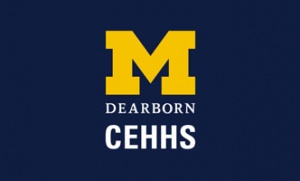

It trains people how to better the lives of those with disabilities, with a focus on working with children with autism.
But a campus partnership launched last fall goes beyond helping those in need of RBT services. It focuses on changing lives by enrolling students in UM-Dearborn’s RBT paraprofessional education program and find meaningful employment upon completion.
Through a U.S. Department of Health and Human Services funded Health Profession Opportunity Grant (HPOG), CEHHS and the nonprofit Volunteers of America (VOA) are working together to help low-income Wayne County residents successfully complete the 42-hour RBT program.
Nearly 20 HPOG recipients have completed the program in the first year of the UM-Dearborn/VOA partnership.
According to Center for Disparity Solutions and Equity Program Manager Jennifer Teller, VOA identifies Wayne County residents to participate in the program based on need and career interests. Participants may receive training fees, dependent care stipends, vehicle repair, training supplies, uniforms, medical screening, background checks, exam fees, books and transportation assistance through the grant.
“Volunteers of America’s goal is to get individuals out of generational poverty by providing immediate training in health professions and introducing them to job opportunities,” Teller said. “This partnership is successful because it is a six-week training for an in-demand field. A number of students have shared that they have a job lined up before they even finish the training.”
The five-year VOA partnership plan—funded by the U.S. Department of Health and Human Services Administration for Children and Families—includes educating 1,250 individuals through the HPOG grant. The college and VOA also are working to expand the opportunities to other certificate, undergraduate and graduate programming associated with healthcare careers.
The benefit is two-fold, according to CEHHS Senior Training Specialist Angela Capuano. People gain access to the healthcare they need and the partnership connects low-income individuals to a meaningful, employable career.
“There is a need for trained professionals. And the students want to turn their lives around and find a good career path so they can help themselves. They also want a fulfilling career where they can help people,” Capuano said. “Grant recipients are serious about their education. Many have told me that they’d like to continue their education in the future and go on for a bachelor’s and beyond.”
In addition to clinical experience and education, the RBT program prepares students to take and pass the RBT certification exam. And because of on-campus job fairs, VOA clients have had exposure to more than 30 organizations seeking out RBT professionals.
Volunteer of America-Michigan Program Manager Chad Forsyth said CEHHS Dean Janine Janosky reached out two years ago and asked the nonprofit what trainings and programs would be beneficial for the clients VOA serves as a social services agency.
“We had a great conversation about mission alignment, the needs of the region, and the importance of working with folks who have barriers and looking for platforms for them to climb,” he said. “It’s really flourished from there. We’ve been very impressed.”
Forsyth said the path to success starts with an opportunity. And the impact made by partnerships like these are far reaching.
“Our clients are getting interviews. They are using what they are learning personally to help them with family members who have mental health issues. They have been introduced to a university setting, for many it is a first time, and they are becoming assimilated to college life,” he said. “This experience goes beyond the six weeks for our clients. It’s their future; their families’ future.”
The RBT training program is one phase in the university’s response to a State of Michigan request for proposals seeking ways to help educate the increasing number of Michigan youth who are diagnosed with autism, as most RBTs work in autism-focused centers. CEHHS programs in this type of health field will include an undergraduate certificate and a graduate program in applied behavior analysis starting in fall 2017.




